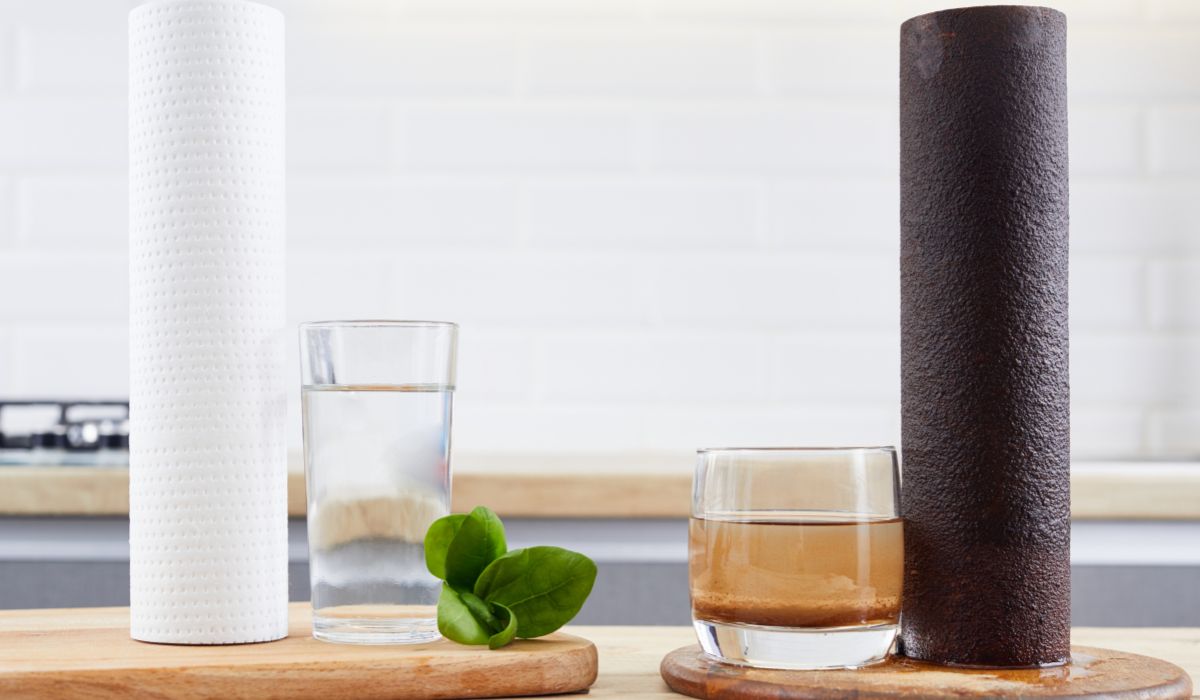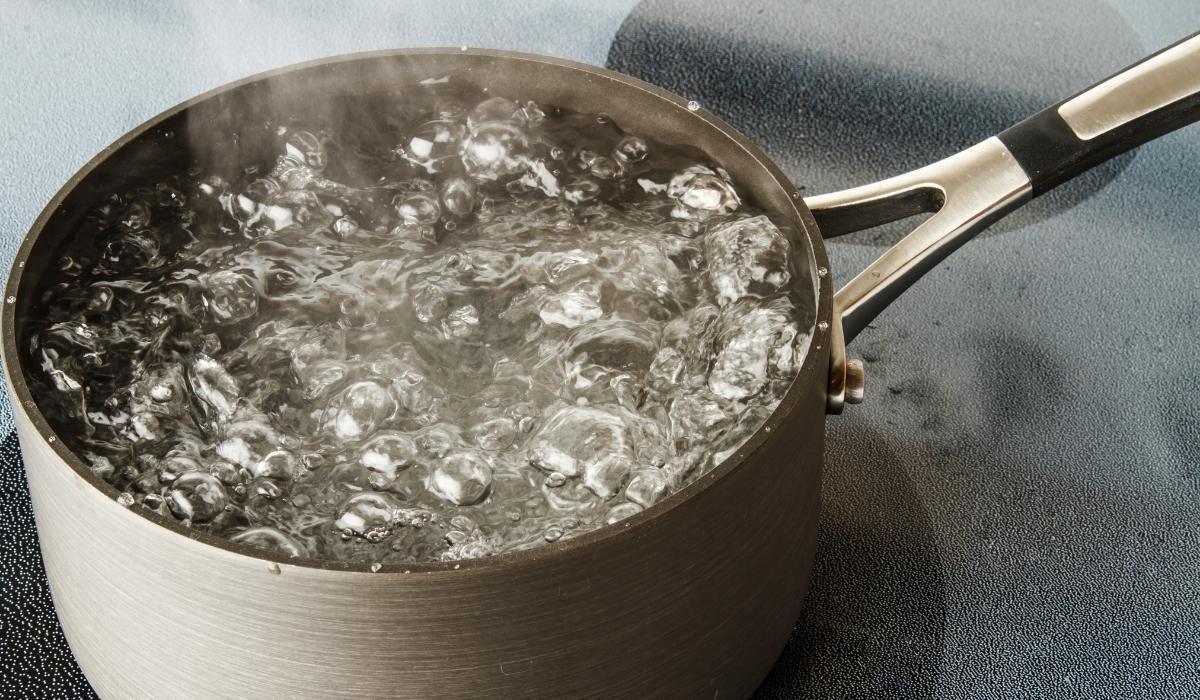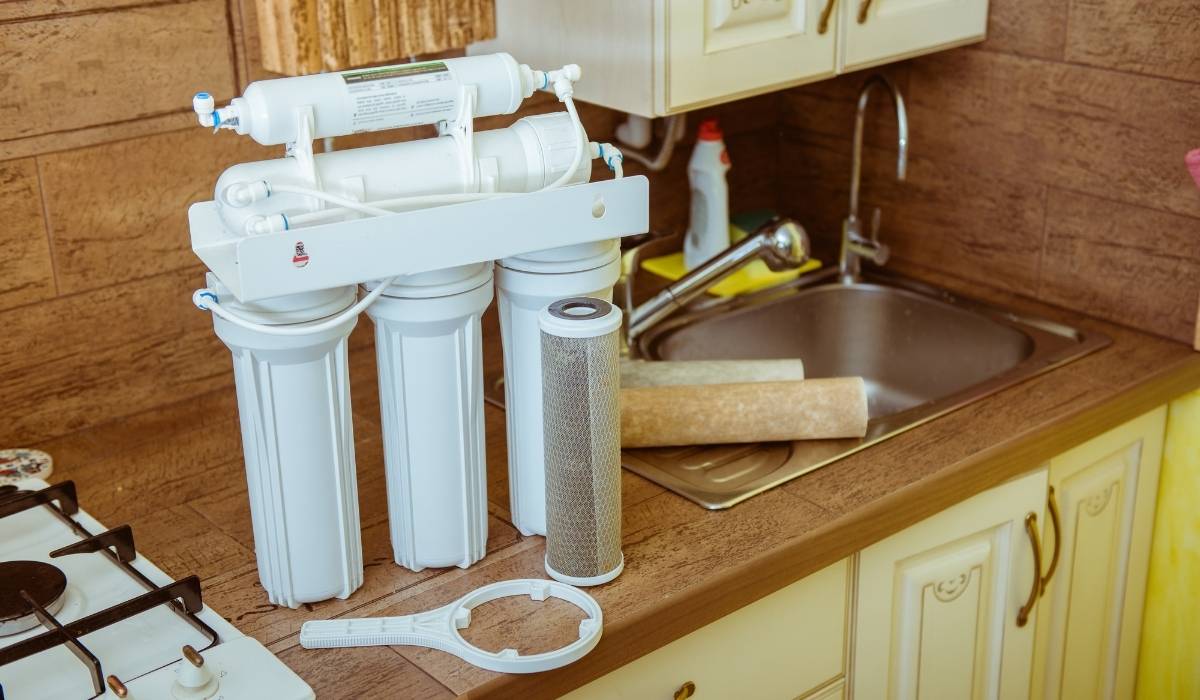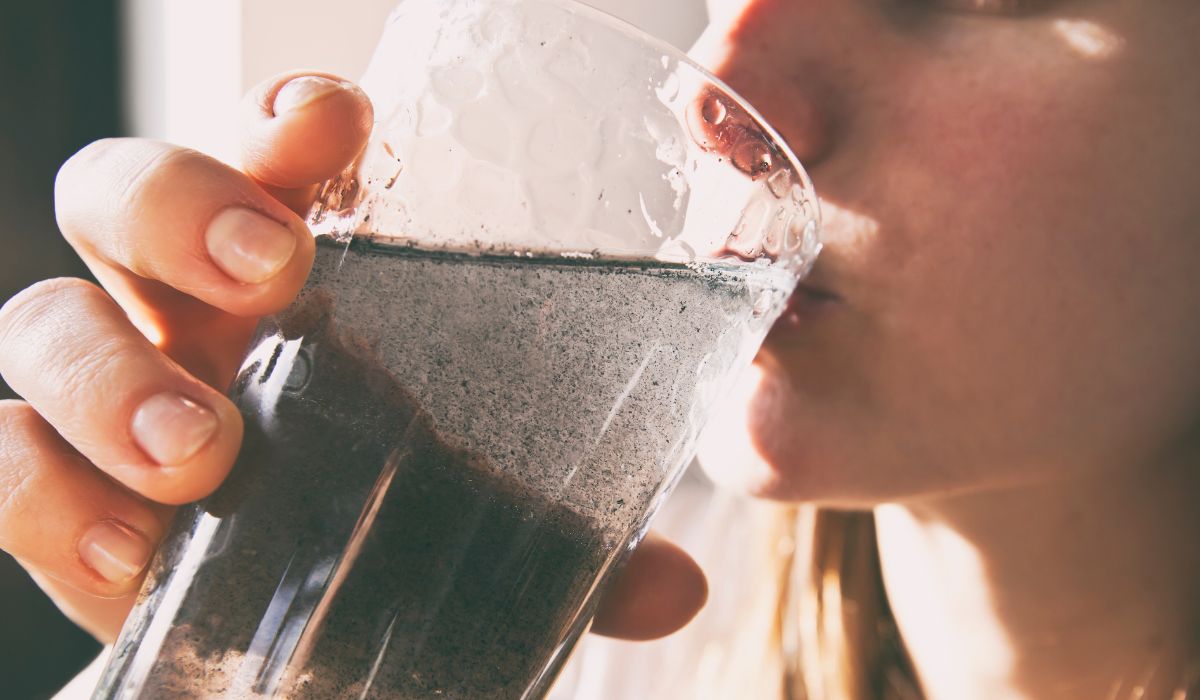“What Happens If I Don’t Change My Water Filter?” is a common question I’ve seen asked by many homeowners across the United States, both online and offline.
If you don’t change your water filter, the water in your refrigerator filters will start to flow slowly as the dirty filter clogs and prevents the water from flowing freely. If the filer stays the same for a long time, it could cause dust to build up in your refrigerator, which could damage some of its parts over time.
Water filters are made to work optimally for about 6 to 7 months. And after that, they stop working as well. This means that pollutants, minerals, and other sediments from the pipes or debris that the water treatment plant doesn’t remove while treating the water can get into your water with ease.
Read on to the end to learn more about reverse osmosis systems and water filtration in your refrigerator.
Why Does The Water Filter Need To Be Changed?
If your water filter light has been red for a while, telling you to change it, but you don’t think you can tell the difference, so you think it’s okay, you’re wrong.
Water filters are made to work well for about six months. After that, they stop working as well. This means that pollutants, minerals, and other sediments from the pipes, or things the water treatment plant doesn’t get rid of, can get into your water supply.
You may also start to smell or taste something strange in the water. This is because the water isn’t being filtered well enough.
What Happens If I Don’t Change My Water Filter
If you decide not to change your water filter, you must be prepared to face the consequences that will come up later. A lousy water filter will dispense water with an unpleasant odor or taste.
A clogged or dirty water filter could also make your fridge’s mechanical parts, like the ice dispenser, work less optimally.
A refrigerator or Reverse Osmosis Systems with a water dispenser is a big investment, so it’s important to take care of it.
Here are the five consequences of not changing your water filters.
#1. Contaminant Accumulation
First off, using water filters beyond their capacity gives room for sediments to build up rapidly and this could make the water filter look rotten and smelly over time.
Aside from sediment, a carbon water filter that is old and worn out can accumulate additional elements and harmful water pollutants.
This buildup of toxins typically appears as “goop,” and it can even leak into your drinking water supply. Unsurprisingly, this “goop” has a detrimental impact on the color, smell, and taste of the water.
#2. Drop in Water Pressure
Again, as your old filter becomes progressively clogged over time, it becomes increasingly difficult for water to pass through the system.
This can be inconvenient because it means waiting longer for the same amount of water, which means that normal home chores like laundry, showering, or simply filling up a water bottle take longer than usual.
#3. Changes in Taste and Odor
If you don’t change your water filter on a regular basis, the filter will become less effective at filtering out the various chemicals, minerals, and bacteria that may be present in the water supply as it wears down.
This may become obvious to you because you will start noticing changes in the taste and odor of the water coming from your refrigerator or your reverser osmosis
#4. Water Without Filtration
If you leaving your water filter unchanged for a long time there is likelihood that the water flowing through the system won’t be filtered anymore.
And this happens you’ll be exposed to all of the chlorine and sediment-filled water, which will have a very bad-taste or smelling water that you were trying to clean up.
#5. Ice Cloudy
Finally, when you don’t change your water filter, when the water in your refrigerator freezes, it becomes hazy rather than clear due to higher mineral content or other dissolved particles.
Please keep in mind that if you’re using your refrigerator’s crushed ice option, this may be difficult to detect, but it will be obvious when utilizing cubes.
The Health Risk of Not Changing My Water Filter
The health risk of not changing your RO water is that you may be consuming harmful chemicals. The most important reason to keep your filter clean is that it removes 99% of harmful chemicals and contaminants from your drinking water, such as lead, asbestos, mercury, cysts, pesticides, and harmful bacteria.
According to the Natural Resources Defense Council (NRDC), approximately 77 million Americans drink water from systems that fail to meet federal health requirements. Among the most frequent pollutants are:
Pathogens
If you don’t change your water fridge or RO water filter for a long time, you could be exposed to bacteria, parasites, and viruses without even leaving your house.
The Centers for Disease Control and Prevention (CDC) reports that between 2013 and 2014, waterborne disease outbreaks caused nearly 300 cases of illness, more than 100 hospitalizations, and 17 deaths.
Lead
Old lead pipes will easily let lead into the water supply. This can cause neurological and behavioral health-related problems in both children and adults.
For good reason, water filters can drastically lower the quantity of lead in your drinking water.
However, new modern brass fixtures can still contain lead, but using a water filter dramatically minimizes the possibility of lead exposure.
Waste
Some waste, especially chemical byproducts, and even radioactive contaminants can get into the water you drink if your filter is worn out or old and due for replacement.
Studies have proven that water captures waste through industry, agricultural and domestic activities that go on in our environment on a daily basis.
The NRDC reports that leaked improper waste storage can tinge water with radioactive material from the production of nuclear weapons and energy.
Asbestos
The World Health Organization (WHO) has said more than once that asbestos, which is mostly used in building materials and insulation, usually gets into our drinking water through a number of ways, such as:
- Industrial waste,
- Atmospheric pollution
- Erosion of piping.
The apex health organization listed the health hazards associated with asbestos to include severe respiratory issues, such as lung cancer and mesothelioma.
A good water filter for your reverse osmosis system can help you prevent excess asbestos-related contaminants from entering your water.
Mercury
Unchecked damaged or worn out water can lead to high levels of mercury in your water, which have been shown to damage the brain, kidneys, and developing fetus in pregnant women.
Generally, mercury levels in drinking water are not high enough to cause serious health problems, but your reverse osmosis system’s filter will eliminate it almost entirely.
How To Know If Your RO Water Filter Is Bad
When your reverse osmosis system or refrigerator is bad and due for replacement, you’ll start noticing something like:
1 Noxious Taste In Your Water
When the water filter for your RO is bad, you’ll likely start noticing some pretty nasty tastes while drinking as well as particles floating in your water.
Materials like metallic and sulfuric can greatly decrease the quality of the taste your water has.
When this happens, you will well appreciate the difference between clean water and contaminated water.
2. Slow Flow Of Water From The Refrigerator’s Faucet
The flow of water from your reverse osmosis or refrigerator faucet will continue to slow down when it is time to change.
The slow flow of the water is a result of the filter being that the pores are clogged up, which then prevents water from passing through at the normal speed.
3. Refrigerator Looks Old
In addition, if you don’t change your filter regularly, the contents of your refrigerator may spoil considerably more quickly than they typically would.
This is because of accumulation, which slows down the system, which then creates a slow flow, and in turn causes the water to taste foul.
4. Cloudy Ice
When you look at an ice cube, do you ever find it strange that you can see right through it?
Don’t you notice that you can see right through an ice cube? This is because the water is clean, but if there are any impurities, the ice will look cloudy
Steps to Change Your Water Filter
Changing your water filter will depend on the type of refrigerator you have. The first step to changing your fridge’s water filter is first identifying what type of filter you have.
Below are the steps to changing the most common filters in your refrigerator.
How To Change The Refrigerator’s Inline Filter
To change the inline refrigerator filter, you will follow the five steps below.
Step 1. Shut off the water supply to the refrigerator’s cold water faucet. But since most of the inline filters have push-to-connect fittings,
Step 2: Insert a fingernail or a flat-bladed screwdriver into the small ring on the fitting and pull the tubing out.
Step 3. Repeat the same process on both ends of the filter.
Step 4. Firmly push the tubing into the fitting of the new filter. Give a gentle tug to ensure the tubing is positioned properly to prevent leaks.
Step 5. Turn on the water supply and check for leakage.
How To Change The “Push-In” Filter In Your Refrigerator
Here are the steps you need to take to change the push-in filter in your refrigerator:
Step 1. Take off your current filter by twisting the cap or pressing the “eject button.”
Step 2: Line up the arrows on the old filter cap and the new filter and turn them clockwise to lock them in place.
Step 3: Keep sliding the filter in until you hear the “eject” button pop.
Step 4: Make sure the cap is tight, then turn the water filter light back on in the fridge.
How to Change the Twist-In (Inside the Fridge) Filter in Your Refrigerator
Here are the steps you need to take to change the push-in filter in your refrigerator:
Step 1: Look in the upper right corner of the fridge for the filter.
Step 2: If there is a cover, open it by pushing or pulling.
Step 3: Turn the old filter counterclockwise to get rid of it.
Step 4: Put the new filter in place and turn it clockwise until you hear a click.
Step 5: Reset the water light on your fridge if it has one.
Step 6: Look for any leaks.
How Much Does It Cost To Change The Water Filter In My Fridge?
The average cost of replacing a water filter in the United States is about $60 per year. Even though the price of a new filter can vary a lot depending on the type of fridge and the materials used.
How Often Do I Need To Change The Water Filter In My Fridge?
Most water filter producers have said that you should change your filter every 6 months. Many refrigerators have a light that turns on when their filter expires and it’s time to change the filter. Please remember to turn off the filter alert light when you’re done replacing the filter.
If you don’t know how to change the water filter in your refrigerator or you think you need a different refrigerator or Reverse Osmosis System, contact us here.
As one of the largest manufacturers and sellers of water appliances in the United States, we will solve your problem quickly and politely. We are proud to serve the United States and the other countries in North America.
Is It Safe To Drink From A Filter That Has Expired?
No, it is not safe to drink from a filter that has passed its expiration date. If the tap water in your area has been rated as heavily contaminated, you might not want to keep using an old water filter.
It’s not a very dangerous thing, though, but it’s highly recommended that you change your water filter when it expires.
Most of the time, you can still drink water through a filter that has just run out of time. Even when we brush our teeth, we put tap water in our mouths. Still, you should change it because bacteria and chemicals do build up over time.
Does A Refrigerator Have An Air Filter?
The simple answer is yes. Many refrigerators have an air filter, and it is an important part of refrigeration because it keeps a steady flow of fresh air going through and gets rid of bad odors.
This is why food that has been frozen stays fresh even after being cooked for a long time. Bacteria in your food can be stopped from spreading by air filters.
Most newer models of refrigerators have built-in air filters, but some older models may not have them.
Anytime you want to buy a refrigerator, please make sure it has an air filter and other helpful features.
When Should a Refrigerator Air Filter Be Replaced?
Air filters are specially designed to be used for several months without needing to be changed. It’s best not to try to clean them, but rather to entirely replace them.
Because the quality of your air filter depends on the brand and manufacturer, you should always buy a refrigerator and reverse osmosis from a well-known brand.
One Filter Replacement every six months should be sufficient time between air filter changes.
Don’t Let Your Water Filter Get Old.
As you may have guessed, the moral of this article is that you do need to change your refrigerator’s water filter to keep it running well.
Even though it might seem like a bit of a maintenance job, you’ll be glad to have clean, good-tasting water all the time.
One Final Thought:
For the sake of your health and the quality of your water, you should replace your old water filter as soon as it has expired.
Old filters get full of gross bacteria and can even change the way your water smells and tastes. A new filter will stop metals, chlorine, and bacteria in water, and a new filter will stop them from going from the faucet to your mouth.
Ben Jordan has over 10 years of experience working in the water treatment industry and has a bachelors degree in water management. Water is his passion and in his free time he’s an aquarist that maintains large saltwater aquariums.




